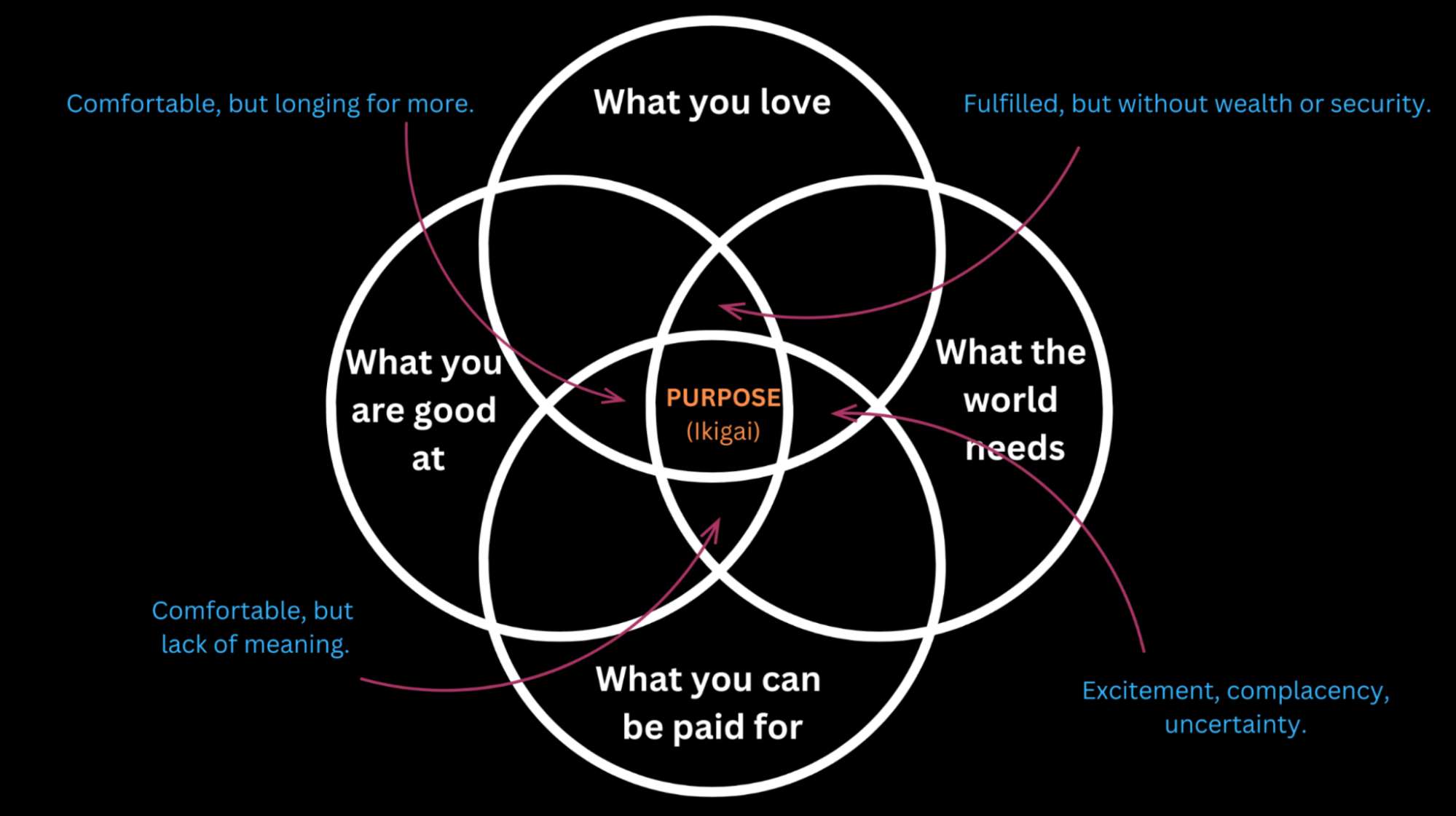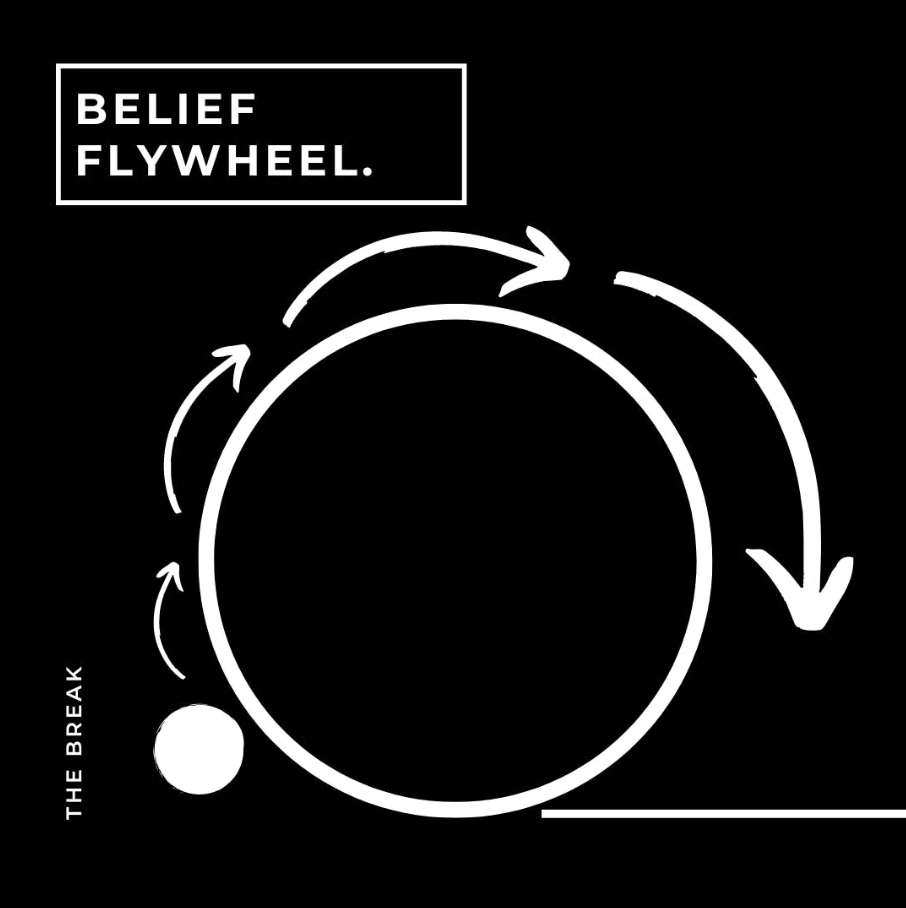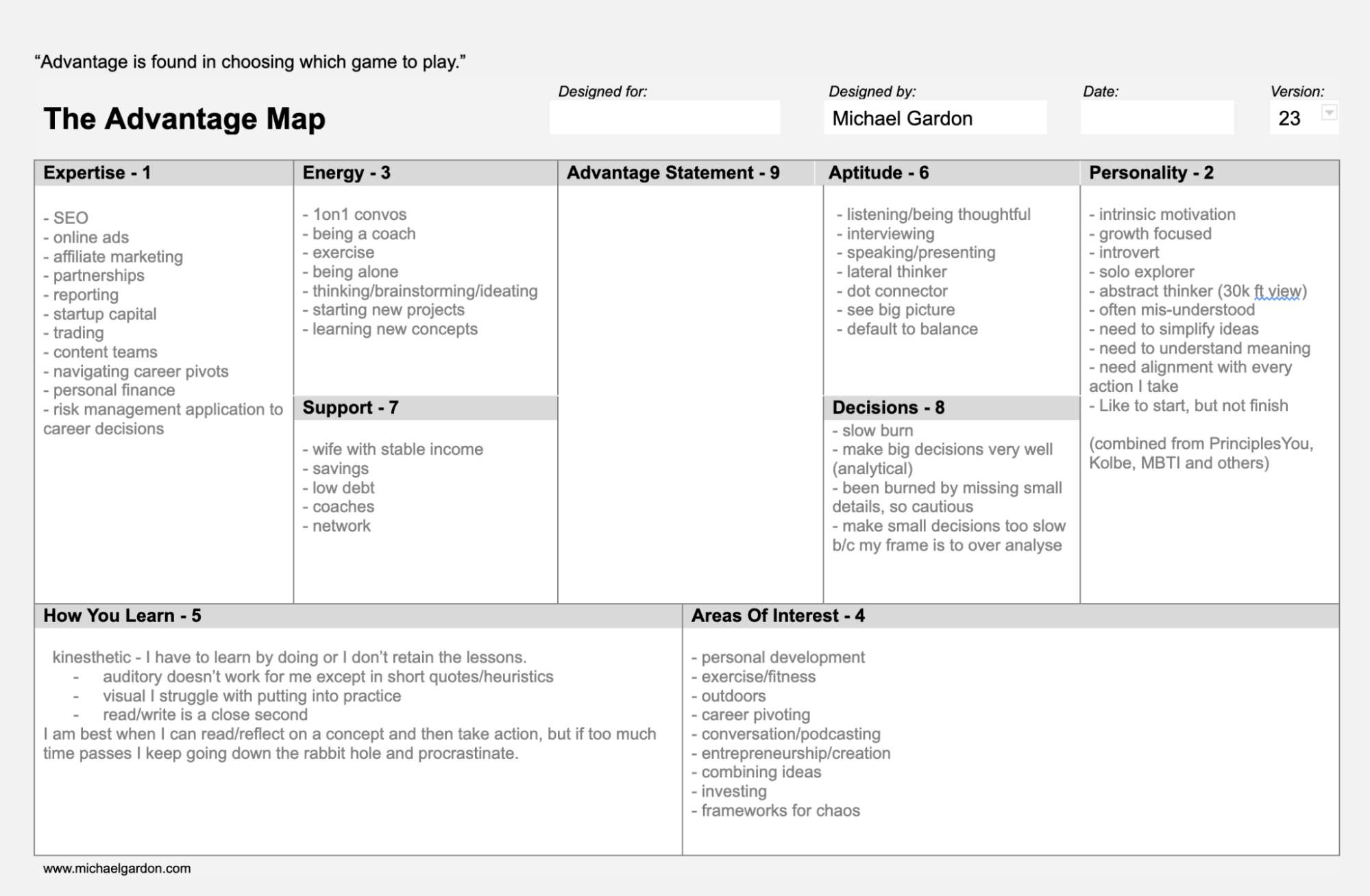If you haven’t found your passion, you’re not alone. Very few people know what they want to do with their lives, and there are many who think they know, only to realize later that they’ve been chasing the wrong ‘passions.’
In fact, a study from Deloitte found that only 13% of people are passionate about their job.
Discover Your Passion Find your unique intersection with Advantage Mapping. For a limited time get $100 off with code THEBREAK100OFF
If you’re ready to do the hard work to set yourself up for a life of purpose, keep reading. I was once in your shoes.
Why Passion Is Hard
I spent years as a Type A go-getter chasing the wrong passions. Until I found myself at 37 years old with an amazing family but still utterly unfulfilled and unpassionate in my career.
Of course, the career advice industry spends a lot of time telling people to find their passion, but as Stanford scientists have proven, this is not very good advice.
The advice is bad, mainly because implementing it is really hard, and the pursuit can be psychologically devastating.
There are two main problems:
- People don’t have a process for discovering their passion, it’s left up to chance.
- Few people believe that you can develop a passion.
While I don’t think everyone can discover their passion, I have been fascinated with how we can up the odds of getting there.
Through trying, failing, and learning I’ve built and documented a coaching protocol to help people find their passion. Here are the steps I think can help anyone up the odds of aligning with their passion.
4 Steps To Find Your Passion
These steps are the exact process we use in my Advantage Mapping Course, which you can learn more about by becoming a member of The BREAK Community for free.
1. First, trade passion for purpose
How many times have you heard of someone following their “passion” by starting a yoga studio or some other small business only to figure out it’s really hard and quit 4 months later?
You can’t blindly follow your passion, you need to believe you have the advantages to be successful at that passion.
I always thought passion was the same as interests, but then I learned about what the Japanese call Ikigai.
Ikigai is a term for your reason of being. Your ikigai is your life’s purpose, and it incorporates the idea of advantage. It’s what brings you joy and inspires you to get out of bed and be your best. It's not about professional accomplishment. It's about finding your bliss.
When you find your Ikigai - your purpose - everything gets easier:
- Find happiness
- You work better
- Have more energy
- Are more optimistic
- Build better relationships
According to Ikigai, your purpose lies at the intersection of:
- What you love
- What you are good at
- What the world needs
- What you can be paid for
But how do you figure it all out?

Ikigai from my Advantage Mapping Course.
2. Define success for you
Success is a lot of things to a lot of people. I don’t expect you to have a concrete definition, but we do need to at least point ourselves in the right direction.
Most people mistakenly define success through the lens of their parents, peers or others that they have seen achieve along a default path.
This tends to make success look like money, a home, a title, cars, etc. I’m not knocking that version of success - I want some of those things as well. I am suggesting that there’s more to success, and you need to define it for yourself.
Some helpful prompts
- Inversion. What is the opposite of success? What do you not want in your life?
- Models. Who embodies success to you? Why? List out their qualities.
- Challenge your assumptions. What have you been told about success from parents, friends, acquaintances, news, and social media that isn’t true for you?
My success definition
When I engineered my way out of corporate life, I started by identifying everything I didn’t want:
- Working 60 hr weeks
- Travel away from my family
- Investors
- Endless meetings
- Huge teams
- Boss
- Titles
- A client service business
- Anything where I charge by the hour
After many iterations, success became:
“Building a small company I control with less than 10 people where I can always be available for my family so I don’t miss anything.”
Many other painful experiences went into that definition, but I’ll spare the details.
Join The Break Community
3. Map your advantages
Success is not the purpose. Your definition of success can change as you experience life and learn. It’s just our target. Success is important, but Purpose is how you get there, so we need a map.
The concept is really simple: when you have an advantage you are better at something, you see more success, you stick with it longer, and you build more success. This is what I call the Belief Flywheel, and it all starts with understanding your advantages.
Advantages also help you set constraints to avoid option overload, and avoid paths that may not be suited for you.

There are 8 sources of advantage that any person can have. Your job is to understand how you can use your advantages to drive your purpose.
- Expertise. What you know. What you are paid for. What you are better than someone else at. We are all experts at something, we just don’t give ourselves enough credit.
- Personality. Who you are at a psychological level. You can’t fight this, so learn deeply who you are and go with that.
- Energy. The activities that get you excited, high, jazzed, stoked. What you want to do and have fun doing.
- Interests. The topic areas where you have natural curiosity. When you follow these you have an advantage over others trying to be interested, but are not.
- Learning. How you learn is important, and can be different for certain topics. How you learn affects your iteration cycles and can create a speed advantage.
- Aptitude. The tasks that you are naturally good at that others struggle with. Are you good with numbers? Are you artistic? Do you listen well? Are you empathetic?
- Support. To do hard things, you need the right alignment and support from your family, friends, and mentors. If you don’t have it, understand how to get it.
- Decisions. We all need to make better decisions, but first we need to understand how we make decisions in order to get better.
I have my students document their advantages in a map. They use introspection and get outside feedback from peers. We take our time and do multiple rounds. This is hard work.
Here is my Advantage Map for reference.

4. Synthesis
Now for the fun part. We get to dream and explore. We are going to combine, stack, and ideate on our advantages to come up with our passion and purpose.
Synthesis Consists Of 4 Steps:
Organize
Take all your notes from the Advantage section and simplify. What are the ones that stick out to you? Are there any that fit together within each section?
The image of my Advantage Map above is organized. There were many pages of notes and Post-Its that went into that tidy little map.
Highlight And Combine Advantages
Now start to look across sections. What advantages go together? Pay particular attention to combining Expertise, Energy, and Interests. These three form the foundation of Purpose.
Ideate Possible Futures
Using the combination of Expertise, Energy, and Interests, my students then play with the intersection of these advantages to figure out a possible future of purpose.
In my course, we actually shoot for multiple paths because we embrace uncertainty and take an exploratory approach to this exercise.
However, I think by deeply engaging with your big three advantages, your purpose will reveal itself.
Write it down in this format:

Stack Advantages Into A Plan
The rest of your Advantages you can use to understand your strategy and approach to moving from where you are toward your purpose.
Figure out your next steps not by looking at what everyone else does, but by looking at what can get you there from your map.
My purpose example:
My purpose is to build a life of freedom by helping others come alive in their work because I believe that finding this alignment is the best lesson I can pass down to my children for their happiness and success. I can get there by leveraging my speaking and writing abilities to influence the way people think about themselves and take action.
What Is Passion?
In the simplest terms, your passions are what excites you. Beyond your likes or interests, passions motivate you to push through difficulties, build skills and connections and stay committed to projects over the long term.
Thinking about your career in terms of finding your passions can be useful because it allows you to focus on what really drives you. This helps you to find work that connects with your deepest values and fosters personal and professional growth over time.
What Passion Isn’t
Being passionate about your work does not mean that:
- You would do it for free. You have bills and you need to pay them. Besides research has shown that feeling appropriately paid for your work is highly correlated with job satisfaction and intent to stay with your employer. This makes sense: no one likes to feel that they’re being ripped off.
- You will always want to do this job. Interests evolve, as do your other priorities and needs. Besides, a hallmark of career passion is that it will inspire you to grow. Eventually, it may lead you to an entirely different career.
- You only care about this particular job or interest. To live a balanced life, you need time and energy for a variety of interests. Don’t let anyone tell you that your job should be your whole life.
7 Helpful Questions To Find Your Passion And Purpose
To find work that will excite your curiosity and inspire you to keep learning, consider these questions:
What do you spend your time doing?
As Annie Dillard wrote, “How we spend our days is, of course, how we spend our lives.” If that’s a less-than-welcome thought, extend yourself some charity–and look again.
What seems like time-wasting may actually be the key to where your interests lie. For example, maybe it seems like you’re spending hours per day scrolling through Instagram or Tiktok, but what are you looking at? Maybe you’re interested in home renovation, or makeup tips–or maybe you’re a budding social media marketer.
What surrounds you?
Look around the room where you spend the most time. What do you see? The books, media, gadgets, art, furniture, clothing, objects, etc. all tell a story of your interests. What are they telling you? Even a mess has insight to give, e.g. that you’re creative, etc.
What do your favorite people have in common?
These folks are your community. What do they value? Chances are, those are your values as well. If you find yourself surrounded by gardeners or nurses or fans of the local sports franchise, pay attention. Your passion may be finding you by showing you what kinds of people you enjoy and admire.
What excites you?
If you’re drawing a blank, get granular. Think of your to-do list: what do you cross off first, not because it’s easy, but because it’s a pleasure? Think of your calendar on your days off. What activities do you love to see scheduled in your day?
What scares you?
Passion isn’t the same thing as fun. To find a career that will engage you and help you grow, you’ll need to be willing to stretch past what you think you can do. So ask yourself: what scares you the most right now? The answer may not reveal exactly what you need to be doing, but it will show you where you can challenge yourself.
What activity makes time disappear?
Flow state is a mode of being in which you’re so absorbed in a task, time seems to stop. It typically involves an activity that is challenging but not so difficult that it exceeds your skill level.
You might find yourself in the flow when painting, or gardening, or playing video games or certain sports. Again, your dream job may not be directly related to the activity that puts you in flow state, but it might give you insight into your interests and skills.
What do you persist in doing even when it's difficult?
To inspire you over the long haul, your career choices must inspire persistence. Even a dream job isn’t pleasant every second of every day. The right fit for you will help you stay engaged even when things are tough.
How To Know If You Are Passionate About Your Work
What does it feel like to be passionate about your job? Although everyone’s experience is different, you may notice some or all of the following:
You Think About Work Even When You Don't Have To
No one aspires to take work home with them, but if you really love what you do, you’re likely to continue thinking about your work even on your own time. (Please note that this is very different from being expected to work after hours, which is destructive to work-life balance and promotes burnout.)
You Persist Even When It's Difficult
When you feel real passion for your work, it’s easier to push through difficulties and reach a solution. It’s just easier to put in the extra effort when you really feel connected to what you’re doing.
You Connect With Others Over The Work
Finding your community can help you find your life’s work, but the opposite is also true. If you notice that you’re building strong connections with your colleagues, chances are good that you’ve found your passion at work.
Connecting To Your Passion And Purpose
I believe that the work of finding your purpose is the most critical work you can do. Imagine spending the rest of your life in total alignment with who you are and getting paid for it!
What could that do for you?
Instead of worrying about productivity or wasting your time rewriting your resume and looking for jobs, you pour your energy into a singular purpose, and the best version of yourself pours out into the world.
To learn more take my Advantage Mapping Course.













